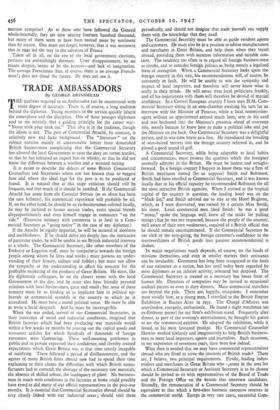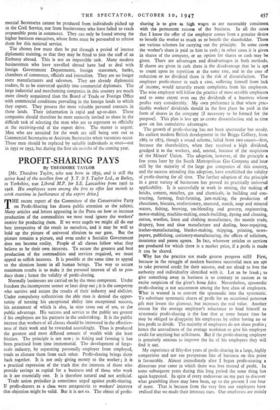TRADE AMBASSADORS
By GEORGE BRINSMEAD
THE qualities required in an Ambassador can be enumerated with some degree of accuracy. Thtre is, of course, a long tradition behind the diplomat. Young members of the service quickly inherit the atmosphere and the discipline. One of these younger diplomats said to me recently that a guiding principle for the career was : "Never stick your neck out." That idea is in the tradition, though the idiom is not. The post of Commercial Attaché, by contrast, is relatively new and lacks background. The " literature " on the subject consists mainly of unreasonable letters from dissatisfied British businessmen complaining that the Commercial Secretary has allowed the local Government to raise the duty on cotton textiles, or that he has tolerated an import ban on whisky, or that he did not know the difference between a woollen and a worsted suiting
It is easier to describe the defects of some British Commercial Counsellors and Secretaries whom one has known than to suggest bow and where the ideal type for the post is to be produced or found. It is natural that at this stage criticism should still be frequent, and that much of it should be justified. If the Commercial Attaché has come from the Consular Service (as so often has been the case hitherto), his commercial experience will probably be nil. If, on the other hand, he should be an ex-businessman enlisted locally, he may be inclined to favour certain trades, assist special friends disproportionately and even himself engage in commerce "on the side." (Excessive intimacy with commerce is as fatal in a Com- mercial Secretary as "going native" in the case of any diplomat.) If the Attaché be rigidly impartial, he will be accused of aloofness and snobbishness. If he should delve too deeply into the intricacies of particular trades, he will be unable to see British industrial interests as a whole. The Commercial Secretary, like other members of the Embassy or Legation staff, must be sympathetic towards the foreign people among whom he lives and works ; must possess an under- standing of their history, culture and foibles ; bin must not allow the sympathy or the understanding to affect his concern for the profitable marketing of the products of Great Britain. He must, like his diplomatic colleagues, be on the closest terms with the local Government of the day, and he must also have friendly personal relations with local businessmen, great and small ; but none of these contacts must be so binding as to implicate him in political up- heavals or commercial scandals in the country to which he is accredited. He must have a sound political sense. He must be able to write a lucid despatch. And he must be incorruptible.
When the war ended, several of our Commercial Secretaries, in their innocence of social and industrial conditions, imagined that British factories which had been producing war materials would within a few weeks or months be pouring out the capital goods and consumer articles for which hundreds of thousands of foreign customers were clamouring. These well-meaning gentlemen in public and in private expressed their confidence, and thereby created expectations which Great Britain was at that time utterly incapable of satisfying. There followed a period of disillusionment, and the agents of many British firms abroad now had to spend their time explaining to their clients the difficulties with which British manu- facturers had to contend, the shortage of the necessary raw materials, the absence of skilled labour, the inadequacy of plant. No business- man in touch with conditions in the factories at home could possibly have erred as did many of our official representatives in the post-war months. It is essential that Commercial Secretaries abroad should be very closely linked with our industrial areas ; should visit them periodically, and should not imagine that trade journals can supply them with the knowledge that they need.
The Commercial Secretary must be able to guide resident agents and customers. He must also be in a position to advise manufacturers and merchants in Great Britain, and help them when they travel abroad, providing them with accurate information and suitable con- tacts. The tendency too often is to regard all foreign business-men as crooks, and to consider foreign politics as being merely a legalised form of corruption. When a Commercial Secretary looks upon the foreign country in this way, his recommendations will, of course, be constantly at fault. He will be unable to win the sympathy and respect of local importers, and therefore will never know what is really in their minds. He will never treat local politicians frankly, and all his negotiations with them will therefore be devoid of mutual confidence. In a Central European countryI have seen H.M. Com- mercial Secretary sitting in an ante-chamber awaiting his turn for an interview with the Minister of Finance, while a local, commission- agent without an appointment arrived much later, sent in his card and was beckoned into the Minister's presence ahead of everyone else, merely because he knew how to make a political joke and pat the Minister on the back. Our Commercial Secretary was a delightful person, and in war-time brave as a lion. He introduced the breeding of wire-haired terriers into the foreign country referred to, and he played a good round of golf.
A Commercial Secretary, while being adaptable to local habits and circumstances, must possess the qualities which the foreigner normally admires in the Briton. He must be honest and straight- forward. In a foreign country I happen to know there was a firm of- British merchants named (let us suppose) Smith and Robinson. Smith had been enrolled as Commercial Secretary, and it was known locally that in his official capacity he recommended Robinson for all the most attractive British agencies. When I arrived at the tropical capital of the country in question, the leading hotel was on the "black list," and Smith advised me to stay at the Hotel Brighton, which, as I soon discovered, was owned.by a certain Miss Smith, his sister. Local commercial men liked Smith: he was a good "mixer," spoke the language well, knew all the tricks for pulling strings; but he was not respected, because the people of the country, well aware of their own weaknesses, required of a British official that he should remain uncontaminated. If the Commercial Secretary be too slick or too easy-going, the foreign customer's confidence in the trustworthiness of British goods (our greatest recommendation) is
shaken. • In major negotiations much depends, of course, on the heads of missions themselves, and even in smaller matters their assistance can be invaluable. Commerce has long been recognised as the basis of our existence as a nation, but has until today been regarded by most diplomats as an inferior activity, tolerated but despised. The Commercial Secretary is treated as a necessary but lower form of human life. Directors of companies may be invited to occasional cocktail parties or even to duty dinners. Mere commercial travellers are beyond the pale. There are, happily, exceptions. I remember most vividly how, as a yOung man, I travelled to the British Empire Exhibition in Buenos Aires in 1931. The Chargé d'Affaires was unorthodox, energetic, enthusiastic. He found a night watchman (an ex-Embassy porter) for my firm's exhibition stand. Frequently after dinner, as part of the evening's entertainment, he brought his guests to see the commercial exhibits. He adopted the exhibition, while it lasted, as his most favoured protégé. His Commercial Counsellor likewise worked tirelessly and imaginatively to help British business- men to meet local importers, agents and journalists. Such occasions, in my experience of seventeen years, have been few indeed.
What then is needed that we may have commercial representatives abroad who are fitted to serve the interests of British trade? There are, I believe, two principal requirements. Firstly, leading indus- trialists and merchants in Great Britain who erate in the area for which a Commercial Secretary or Assistant Secretary is to be chosen should be invited to sit with representatives of the Board of Trade and the Foreign Office on the boards that interview candidates. Secondly, the remuneration of a Commercial Secretary should be equivalent to that which a first-class business executive receives in the commercial wold. Except in very rare cases, successful Corn..
. mexcial Secretaries cannot be produced from individuals picked up in the Civil Service, nor from businessmen who have failed to reach responsible posts in commerce. They can only be found among the higher business executives, whose firms must be persuaded to release them for this national service.
The chosen few must then be put through a period of intense diplomatic training, so that they may be fitted to join the staff of an Embassy abroad. This is not an impossible task. Many modern businessmen who have travelled abroad have had to deal with foreign Government Departments, foreign statesmen, banks, chambers of commerce, officials and journalists. They are no longer mere manufacturers and salesmen. They are already diplomatic traders, fit to be converted quickly into commercial diplomats. The large industrial and merchanting companies in this country are much more closely acquainted than the Board of Trade or Foreign Office with commercial conditions prevailing in the foreign lands to which they export. They possess the most valuable personal contacts in those lands. Their information is rapid and up-to-date. These companies should therefore be most earnestly invited to share in the difficult task of selecting the men who are to represent us officially at the receiving-end of the export drive. The matter is urgent. Men who are unsuited for the work are still being sent out as Commercial Secretaries or Assistant Secretaries when vacancies occur. These men should be replaced by suitable individuals at once—not in 1951 or 1952, but during the first six months of the coming year.



































 Previous page
Previous page